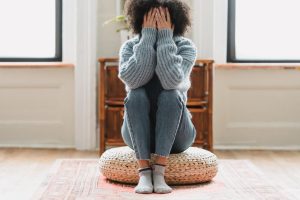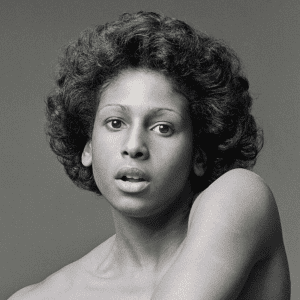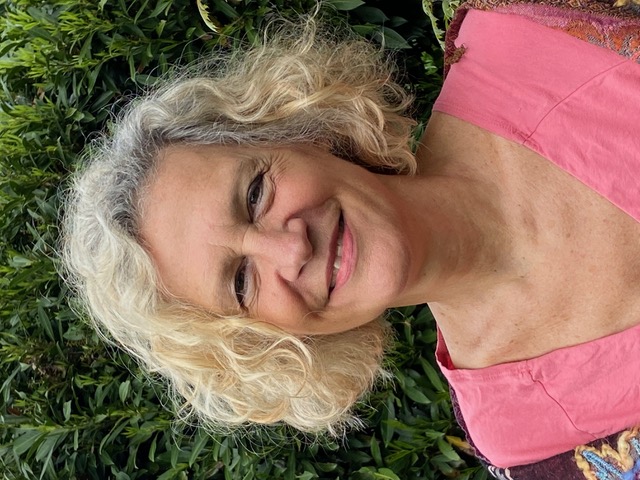 We are living through incredibly difficult times. Wars in Ukraine and the Middle East, our planet warming at warp speed, intense weather events our new reality. Our government is polarized into paralysis, no end in sight to gun violence, racial inequity, the toxic influence of social media, the threats of AI and a global pandemic that rocked the very foundation of our sense of safety. It is enough to make us take cover and withdraw into isolation. Though we may be living our daily lives here in Princeton, we are witnessing images on the news that are devastating, hard to hold. We are looking for relief from the onslaught, for ways to soothe ourselves from the daily images of war, suffering and devastation. These are natural defenses to a chronic and ever-growing threat that can bring on feelings of powerlessness and hopelessness, a toxic brew that can lead to increased anxiety and depression. So, what are we to do? How can we find ways to cope? Who do we turn to for support, to fill our tanks and keep us going?
We are living through incredibly difficult times. Wars in Ukraine and the Middle East, our planet warming at warp speed, intense weather events our new reality. Our government is polarized into paralysis, no end in sight to gun violence, racial inequity, the toxic influence of social media, the threats of AI and a global pandemic that rocked the very foundation of our sense of safety. It is enough to make us take cover and withdraw into isolation. Though we may be living our daily lives here in Princeton, we are witnessing images on the news that are devastating, hard to hold. We are looking for relief from the onslaught, for ways to soothe ourselves from the daily images of war, suffering and devastation. These are natural defenses to a chronic and ever-growing threat that can bring on feelings of powerlessness and hopelessness, a toxic brew that can lead to increased anxiety and depression. So, what are we to do? How can we find ways to cope? Who do we turn to for support, to fill our tanks and keep us going?
The answer might seem simple, but it is the one that resonates with me, and that is, ourselves and each other. You might say. “You think that will solve the world’s problems, find a solution to what ails us and our planet? Are you out of your mind?” Well, hopefully yes, I am out of my mind when I speak from the heart and, it might just be what is needed right now, to drop into our hearts and connect with the common denominator that unites us all, our humanity. I believe that is why these images coming out of Ukraine and the Middle East are impacting us so deeply. We are looking at our parents, spouses, brothers, sisters, and our children. Their suffering is our suffering. There is no separation, we are one global human family. If we can allow that reality to really sink into our hearts, we will grieve and feel the sorrow. A sorrow that keeps the heart open, the very place where the healing happens. We need to find a way to feel our grief more and air our grievances less. I get the temptation to go to rage and outrage. I feel it too, and it has its place to mobilize us into action.
 It might seem counter-intuitive to welcome grief as relief but allowing ourselves to feel the sorrow of the suffering we are witnessing in our world is so important right now. Grief is the shadow side of love. You can’t have love without grief. If we suppress the grief, we dim the power of love. So, when the images of the suffering break your heart, allow and feel. This can feel scary because our society has not encouraged this kind of way of being. We love to think our way out of our suffering. Anger has its place. If channeled well, it has the power to move mountains, but our hearts hold tremendous power, wisdom and potential for healing too.
It might seem counter-intuitive to welcome grief as relief but allowing ourselves to feel the sorrow of the suffering we are witnessing in our world is so important right now. Grief is the shadow side of love. You can’t have love without grief. If we suppress the grief, we dim the power of love. So, when the images of the suffering break your heart, allow and feel. This can feel scary because our society has not encouraged this kind of way of being. We love to think our way out of our suffering. Anger has its place. If channeled well, it has the power to move mountains, but our hearts hold tremendous power, wisdom and potential for healing too.
So, if the times call for self-compassion and community, what does that mean or look like? Isn’t self-compassion selfish navel gazing when humanity needs all hands on deck? Think of this, when a dear friend calls you in distress, you respond to them with love, patience and understanding, you are being compassionate with them. Self-compassion is simply learning to give this same kindness and care to yourself. When we are able to give to ourselves through this mindful practice, we fill ourselves up. That then helps us to more easily turn to others and give from the heart rather than from a sense of obligation.
 Our connectedness is another avenue to move through our new world. I might not be able to end the wars or fix the existential threat of global warming, but I can once in a while make a conscious effort to put my phone down and connect with my fellow humans. Who’s in line next to me at McCaffrey’s or while I am waiting for my flight at Newark? Do I have the heart to give a stranger a smile, start a conversation with someone who’s on a different end of the political spectrum? Can I hold back my judgement and listen with compassion? Easier said than done, but I can’t help but believe that this is one of the ways out of this mess.
Our connectedness is another avenue to move through our new world. I might not be able to end the wars or fix the existential threat of global warming, but I can once in a while make a conscious effort to put my phone down and connect with my fellow humans. Who’s in line next to me at McCaffrey’s or while I am waiting for my flight at Newark? Do I have the heart to give a stranger a smile, start a conversation with someone who’s on a different end of the political spectrum? Can I hold back my judgement and listen with compassion? Easier said than done, but I can’t help but believe that this is one of the ways out of this mess.
Carl Jung said that what we deny comes to us as fate. What have we failed to see or been blind to? This isn’t about blame either but rather about taking responsibility. Our shame infused society often prevents us from being willing to look at what we might be responsible for, what we might need to take a look at inside ourselves. We go to shame right away and can’t tolerate what we perceive of as shameful when it is really only a factor of our humanness, the very humanness that connects us all.

So yes, donating and dedicating ourselves to helping by getting involved does help with the feelings of apathy and helplessness that can overtake us. Our mindset however is also a big avenue for relief and healing. I find myself also turning to more time in nature, perhaps a walk around Mountain Lakes or with animals at Terhune Orchards. Both ground us and bring us into the present moment. The healing power of art is also there for us. Maybe check out The Ten Commandments Renée Cox opening November 18th on at Art on Hulfish or take a class at the Arts Council of Princeton. Any practice that helps us drop into our para sympathetic nervous system out of our fight or flight response is crucial to do right now. Meditation, yoga, deep breathing and laughter all work magic for this. Think of your heart and nervous system as a tank that needs to be emptied of garbage daily, so you can make room for presence. So, remember to take a deep breath, look up and around once in a while. No need to join the monastery, but dropping into the moment with presence might just give us some of the juju needed to find our way through these challenging times with heart, compassion and the occasional sprinkling of grace.

Josée Graybill is the founder of the Nomad Center for Counseling, a practice that offers psychotherapy in English and French. She is a French Canadian originally from Montreal. She is an artist who exhibits her paintings locally. She lives in Princeton with her husband and her dog.
